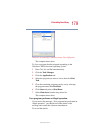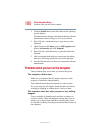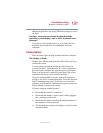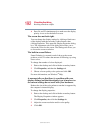
185
If Something Goes Wrong
Resolving a hardware conflict
5.375 x 8.375 ver 2.3
Resolving hardware conflicts on your own
Computer components need resources to accomplish a task.
A device, such as a disk drive or a modem, needs a channel to
the computer’s Central Processing Unit (CPU). It also needs a
direct channel to the computer’s memory to store information
as it works. These channels of communication are commonly
referred to as system resources.
Direct Memory Access
Similarly, the data required by the device is stored in a
specific place or address in memory called the Direct
Memory Access (DMA). The DMA provides a dedicated
channel for adapter cards to bypass the microprocessor and
access memory directly. If two or more devices use the same
DMA, the data required by one device overwrites the data
required by the other. That may cause a hardware conflict.
Plug and Play
With Plug and Play and the Windows
®
XP operating system,
avoiding hardware conflicts is easy. Plug and Play is a
computer standard that helps the system BIOS (basic input/
output system) and the operating system to automatically
assign resources to Plug and Play-compliant devices. In
theory, if every device connected to the computer is Plug and
Play-compliant, no two devices will compete for the same
system resources. Simply plug in the device and turn on your
computer. The operating system automatically sets up your
system to accommodate the new device.
If you install an older (legacy) device that the operating
system cannot recognize, the operating system may have
difficulty assigning resources to it. As a result, a hardware
conflict can occur. To see what resources the operating
system has assigned to the device, see “Checking device
properties” on page 187.


















